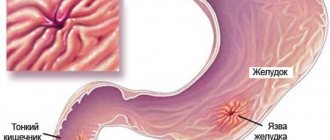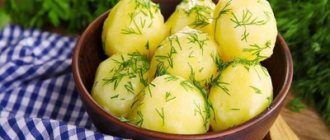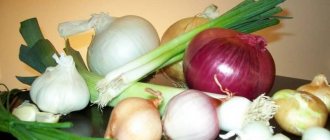Dill is one of the most accessible and aromatic seasonings. It is used in cooking, cosmetology, and alternative medicine as a medicinal and prophylactic remedy for various diseases. This green has healing properties and is effective in treating gastritis, colitis and other gastrointestinal diseases.
To restore the body, it is important not only to use medications, but also to correct eating behavior. With gastritis, restrictions on the menu are inevitable. To diversify the dietary table and reduce inflammation of the gastric mucosa, dill is used. Let's figure out whether it has contraindications, what daily dosage is acceptable, and what folk recipes show the best therapeutic effect.
Chemical composition
Dill is considered one of the most popular spices, the chemical composition of which can safely be called a storehouse of a whole complex of active biological substances, micro- and macroelements.
Read more about the vitamin composition of dill.
The main components of the plant are:
- vitamin A : required for the growth and proper development of new cells, regulates protein synthesis, normalizes metabolic processes;
- vitamin E : has antioxidant properties, prevents premature aging of the body, protects cells from the negative effects of free radicals;
- vitamin C : increases the protective properties of the human body, helps strengthen the immune system;
- vitamin P : repeatedly strengthens the walls of blood vessels, prevents the formation of blood clots, and is involved in regulating blood pressure;
- calcium : required for strengthening and building bone and muscle tissue, regulates hematopoietic processes, promotes the proper formation of the skeleton;
- potassium : ensures proper functioning of soft tissues, improves the functioning of the cardiovascular system, has an anti-sclerotic effect;
- magnesium : takes part in all biochemical processes, is responsible for the stable functioning of the heart muscle, and normalizes the functioning of the nervous system;
- iron : provides tissues with oxygen, prevents the development of iron deficiency in the blood, normalizes metabolic processes;
- manganese: fights free radicals, takes part in the synthesis of fatty acids, improves the functioning of the immune system, regulates blood sugar levels.
The chemical composition of the herb is supplemented with essential oils, fiber, essential and essential acids. In addition, dill contains easily digestible carbohydrates, which are quickly burned during life and are not stored as fatty tissue. The plant is considered low-calorie and is excellent as one of the main seasonings for weight loss.
Did you know? Dill loses its exquisite aroma during heat treatment, which is why it is recommended to add seasoning to ready-made dishes to preserve the aroma.
Composition and benefits of dill
Dill is a well-known and very common plant with a distinct spicy smell. Its greens contain a lot of vitamins, in particular PP, A, C, P, B6. in addition to them, it contains mineral salts.
In general, experts remind us how rich and varied the chemical composition of ordinary dill is. It is not surprising that due to the favorable content of magnesium and iron salts in the greenery of this plant, which are also found here in an accessible form, an increase in hematopoietic processes is noted. But the essential oils of this plant promote the formation and functioning of digestive enzymes.
Properties of dill for the human body
This umbrella plant has a number of beneficial qualities, but for some categories of people its consumption can be harmful to the body.
Benefit
The benefits of umbrella grass are due to its multifaceted chemical composition. Thanks to the harmonious combination of unique components, it has a sedative, antispasmodic, antimicrobial, restorative, expectorant effect, and allows you to improve the functioning of many body systems.
- Dill seeds and greens are used for:
- normalization of digestion, improvement of the gastrointestinal tract;
- increased appetite;
- combating insomnia;
- normalization of the cardiovascular and nervous system;
- improved vision;
- blood pressure regulation;
- for problems with high stomach acidity;
- prevention and treatment of constipation and diarrhea;
- increasing potency;
- normalization of the level of “female” hormones.
The increased content of ascorbic acid in the herb allows you to successfully fight colds and increase the body's protective functions against the harmful effects of external factors. The substances that are available normalize the functioning of the digestive system, neutralize putrefactive processes in the intestines, which makes it possible to improve the condition of the body with gastritis, stomach ulcers, and bloating.
The spice also helps maintain the youth of the body, prevents the appearance of wrinkles on the skin, improves cell regeneration, and cleanses of toxins and harmful substances. The beneficial properties of the plant help fight such ailments as gout, cholelithiasis, cataracts, glaucoma, headaches, and bronchitis.
Harm and contraindications
- Do not forget that, like any other medicinal plant, dill has a number of contraindications for use:
- pregnancy, especially the first trimester;
- individual intolerance and the presence of allergic reactions to essential oils;
- hypotension;
- atony is a disease characterized by a sharp drop in the tone of internal organs and skeletal muscles;
- the presence of a cluster of large stones in the urinary and gall bladder.
Use in cooking
Best materials of the month
- Coronaviruses: SARS-CoV-2 (COVID-19)
- Antibiotics for the prevention and treatment of COVID-19: how effective are they?
- The most common "office" diseases
- Does vodka kill coronavirus?
- How to stay alive on our roads?
Dill is widely used for pickling vegetables, and even umbrellas with not yet ripened seeds are used. It is often used to flavor dishes, to give a pleasant aroma to cheese, but it is recommended not to combine dill with other spices, because its aroma and taste are already quite strong.
If you want to store dill for future use in winter, you can dry it in a cool, dark place. Rest assured that it will not lose either its aroma or its beneficial properties. Seeds can also be harvested and stored throughout the year, using as needed.
Thanks to the properties of dill to dilate blood vessels, it helps get rid of headaches and migraines, and also helps to relax the intestines. It also helps lower blood pressure when used regularly, but you should consult your doctor before consuming it. The properties of dill can be considered universal, since it is used to combat salt deposits in combination with therapeutic massage and sports activities. It helps fight obesity by acting as a supportive medication in combination with diets and exercise. It is even recommended for those who suffer from diabetes.
A weak decoction of dill is used to relieve inflammation of the eyes and fight certain diseases such as conjunctivitis. The seeds of this plant are able to relieve spasms, fight pathogenic bacteria and increase the flow of bile from the body [9].
If you do not like the taste of dill seed infusion, you can use it in its pure form. To do this, you need to take them orally 3 times a day in dry form with water. A small pinch is enough for the effect to be noticeable with regular use. This remedy is good for intestinal problems, including gas or constipation. Dill brings no less benefit to those people who have skin diseases, including those associated with improper functioning of the stomach or intestines.
Another way to use dill is to use a special essential oil made from it. The oil is taken 10-15 drops 3 times a day, it is advisable to combine it with sugar to brighten up the not very pleasant taste.
The effect of dill seeds on various types of gastritis
One of the most common forms of gastrointestinal ailments is gastritis, an inflammatory disease of the gastric mucosa, a common symptom of which is pain in the upper abdomen. In addition, gastritis can be accompanied by heartburn, nausea, headache, and general malaise of the body. To alleviate the condition, various medications are used, as well as natural remedies, in particular, dill seeds and greens.
Important! If you adhere to the required dosages and timing of treatment, dill will not be able to harm the body.
However, before using it for medicinal purposes, you must consult a doctor. At the same time, several types of the disease are distinguished: gastritis with low and high acidity.
Dill effectively helps combat discomfort in both cases. The effectiveness of plant seeds has been repeatedly proven for gastritis with high acidity. Once in the digestive tract, they help the correct flow of metabolic processes, normalize acidity levels, and reduce the symptoms of heartburn. Moreover, the seeds facilitate the digestion process, especially when it comes to heavy fatty foods. Regular consumption of dill for this disease makes it possible to minimize pain and discomfort and, most importantly, to prevent the development and aggravation of the disease.
Infusions and decoctions of dill seeds bring benefits when gastric secretion is reduced. They help organize daily regular bowel movements, normalize acidity levels, speed up metabolic processes, and improve the functioning of the pancreas. The products allow you to activate secretion production and have an anti-inflammatory and enveloping effect.
Important! Dill has the ability to increase gastric secretion, which leads to increased acidity. That is why when treating gastritis with different degrees of acidity, the dosage should be strictly observed, especially if the disease occurs as an increased secretion.
Treatment with dill seeds
Dill infusion and decoction are used to treat various diseases. The choice of remedy depends on the disease to be fought. Dried seeds, which have a more pronounced effect, are well suited for this. There are many ways to prepare the infusion, but in general the recipes are very simple and similar. For example, to prepare an infusion, you need to pour boiling water over dill seeds and leave for a while, then strain and take. The infusion time depends on whether fresh or dried seeds were used, as well as on the specific disease you are trying to fight. There is one general rule: it is believed that it is advisable to grind the seeds before brewing, so they will have a more pronounced effect.
To make a decoction, you need to pour dill seeds with water and boil. On average, you need to take 1 tablespoon of raw material per 1 liter of hot water. The resulting mixture should be brought to a boil in a water bath and simmered for several minutes, and then allowed to cool and consumed. You can even use the seeds without pre-treatment, but in this case it is advisable to grind them into powder using a coffee grinder so that the healing effect appears faster.
Consumption standards
When treating gastritis with high and low acidity, special attention should be paid to the concentration and dosage of products prepared on the basis of dill. Traditional medicine offers many different recipes to combat the disease. The norms for seed consumption will depend on the type and stage of the disease and are determined individually in each individual case.
As a rule, for gastritis that occurs with high acidity, decoctions and infusions prepared with the addition of a small amount of dill seeds are used for therapy. In case of reduced secretion, they are treated with powdered seeds or decoctions with a high concentration of raw materials.
Dill seeds for newborns
Dill seeds are great for newborn babies who often suffer from colic. This is an excellent alternative to chemical drugs sold in pharmacies. To help your baby, you need to prepare the following decoction: pour 1 teaspoon of seeds into 250 ml of hot water and let it brew for 1 hour. Then carefully strain the liquid and give the child 1 teaspoon 3 times a day 20 minutes before feeding. If you are just starting to help your baby with dill seeds, give this infusion a little at a time, initially 1 teaspoon per day, to make sure that the child responds normally to this treatment.
How to properly use dill for gastritis
Of course, the treatment of gastritis must be comprehensive, with mandatory adherence to a special diet. Products prepared from dill seeds are not a drug that can completely cure the disease; they serve as maintenance therapy to alleviate the patient’s condition and prevent further development of the disease.
We recommend finding out whether dill seeds help with pancreatitis.
Before deciding to use dill to treat gastritis, you should consult with your doctor and find out whether the seeds can be eaten in certain forms of the disease.
For gastritis with high acidity
- The following infusion helps reduce inflammation of the stomach and reduce secretion: 2 tsp. chopped dill or 1 tsp. seeds, pour 500 ml of hot water, leave in a thermos for 30 minutes. Take according to the following regimen: 1/3 cup three times a day before meals.
- You can also reduce discomfort by consuming this mixture: 1 tsp. Mix dill juice with 1 tsp. honey. Consume the product 1 tsp. before meals.
For gastritis with low acidity
- The following recipe will help solve problems with the gastrointestinal tract: grind the seasoning seeds into powder using a coffee grinder. Take 0.5 tsp. powder during meals with a small amount of water.
- A decoction that is effective for illness is: 1 tbsp. l. add seeds to 1 cup of boiling water, bring to a boil, set aside for 30–40 minutes. Drink the strained broth 0.5 cups 3-4 times before meals, adding a little honey.
Did you know? In ancient times, dill was grown for a long time as an ornamental plant.
Bouquets of it were given to girls, and the smell of the grass competed even with the sweet aroma of roses. Dill is an affordable, tasty and extremely aromatic seasoning that not only decorates and complements the taste of any dish, but also serves as an excellent medicine for the prevention and treatment of gastritis. Depending on the concentration, the herb can reduce or increase gastric secretion, improve digestion, normalize the functioning of the gastrointestinal tract, relieve the patient from unpleasant and painful sensations, and prevent further development and aggravation of the disease.
The effect of dill
Dill infusions and decoctions have been used for a long time to treat all kinds of problems with the gastrointestinal tract. Cramps, flatulence, diarrhea and constipation, stomach cramps - in all these cases, fragrant dill will help.
The plant soothes the gastric mucosa, normalizes digestion, promotes the removal of waste products from the body, and even relieves pain from ulcers. Its correct use improves the acid-base balance in the stomach and neutralizes bad breath.
Benefits and harms
The benefits of dill are manifested in the form of:
- normalization of metabolic processes;
- regulation of protein synthesis;
- antioxidant properties;
- strengthening the immune system;
- regulation of blood pressure.
It can cause harm if consumed in excess. Manifested by the following side effects:
- dizziness;
- nausea;
- weakened vision;
- prostration;
- apathy and drowsiness.
In order for a product to bring exceptional benefits to the human body, you need to know the limits in its use, therefore, before treatment, consultation with a specialist is required.
Interesting ! 100 g of dill contains the daily requirement of vitamin C.
Norms and rules of use
You can eat about 7-9 tablespoons of dill per day without harm to health.
For gastritis, regardless of acidity, it is recommended to drink tea from this plant or drink a decoction based on dill seeds before meals.










